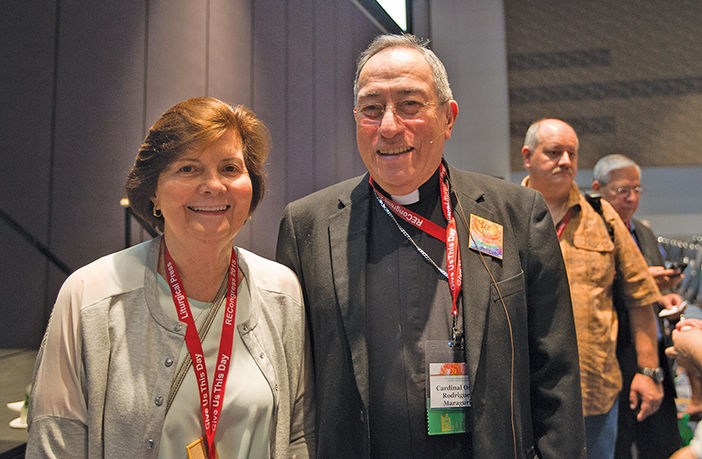On March 14, during the Los Angeles Religious Education Congress, Cardinal Oscar Rodriguez Maradiaga of Honduras spoke on the “Church of the Future” by emphasizing the need for ongoing catechesis, highlighting Pope Francis’ special mission and discussing with audience members the obstacles the Church must overcome.
Pope John Paul II appointed him a cardinal in 2001 and today he chairs the Council of Cardinals to advise Pope Francis on reforming the Roman Curia.
“Many people think that catechesis is only the preparation for a sacrament, especially for first communion and for confirmation,” Cardinal Rodriguez said. “And that is wrong.”
He called catechism a “continuous and systematic education of the faith,” adding “all of us need this kind of education.” A childish faith is not enough to support the adult life, he said.
He added that the need for proper formation is real. Young Catholics make frequent requests to him for more formation.
He urged Catholics to read the Scriptures while encouraging everyone to read Pope Francis’ Evangelii Gaudium, since it lays out the Church of the future.
Cardinal Rodriguez said that the Church of the future should have a renewed desire for a personal relationship with Jesus Christ. Pope Francis wrote in his encyclical, “I invite all Christians, everywhere, at this very moment, to a renewed personal encounter with Jesus Christ, or at least an openness to letting him encounter them; I ask all of you to do this unfailingly each day.”
He also stressed Pope Francis’ desire for “a poor Church for the poor.” When the newly elected pope chose the name Francis, he told the cardinals it was because he admires St. Francis of Assisi and his life of poverty.
Cardinal Rodriguez said that he witnessed Pope Francis’ poverty and simplicity when the newly-elected pope decided against complicated vestments for the liturgy and requested a white sash without the usual embroidered coat of arms.
After the conclave, Pope Francis rode with the cardinals in a bus instead of the limousine that was waiting for him. He told the cardinals, “I will ride in the bus as I came.” He then stayed with the cardinals at Casa Santa Marta, a guesthouse for visiting bishops and cardinals and a home for priests who work at the Vatican.
He wanted to live with others, Cardinal Rodriguez said. When Pope Francis went to visit the papal apartments he called them a prison and a reversed funnel where people can only enter through drops. “He said, ‘I need the contact with the people.’”
He also celebrates Mass every day in the chapel of Santa Marta where the first guests were the Vatican gardeners. He eats in a common dining room and serves himself from the buffet.
“Many times we can meet him in the corridors or in the lift,” the cardinal said. “This is a beautiful message of simplicity.”
Hope and joy in the Gospel message should also mark the life of a Christian, he said, in addition to giving and receiving mercy from others and accepting God’s mercy.
This month, Pope Francis announced a jubilee year dedicated to the virtue of mercy. “No one can be excluded from the mercy of God,” Pope Francis said, after making the announcement during a Lenten ceremony at St. Peter’s Basilica.
A woman from the audience asked a question about the complexity of the Curia’s writing.
“I have a hard time with the words of Curia,” she said, referring to the 2015 synod survey. “When this new survey came out with all these questions, [it] was written in a language that was really difficult to understand.”
“I’m a well-educated woman, my friends are well educated. They didn’t want to admit that they had no idea what this survey was asking. So what will it take?” she asked. “I love this idea of simplicity. What will it take to simplify the language of the Church?”
Questions from the survey were ambiguous, used very general terms and confusing syntax. Sample questions for the survey, estimated to take an hour to complete, include: “To what extent and by what means is the ordinary pastoral care of families addressed to those on the periphery?”
Another survey question asked, “In a particular way, what response is to be given to problems arising from the continuity of traditional forms of marriage in stages or those between families?”
Cardinal Rodriguez agreed with her about this problem, adding that the lay Catholics under his care also have this difficulty, especially the uneducated diocesan members. He said that the Church needed better translators.
“And it’s important that people like you give all observations in order to start this process,” Cardinal Rodriguez said. “But it is necessary to simplify the language.”
He asked that Catholics who find these types of problems speak out by writing to those in charge.

